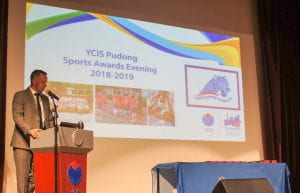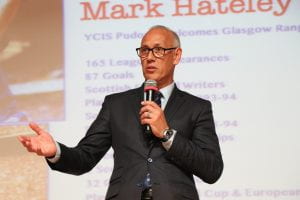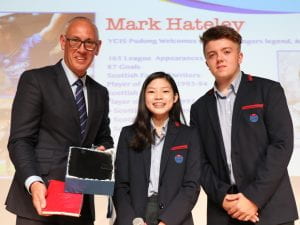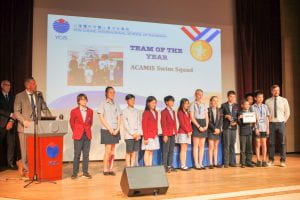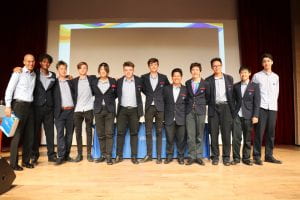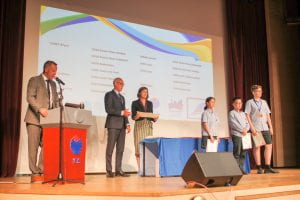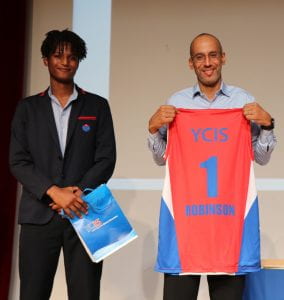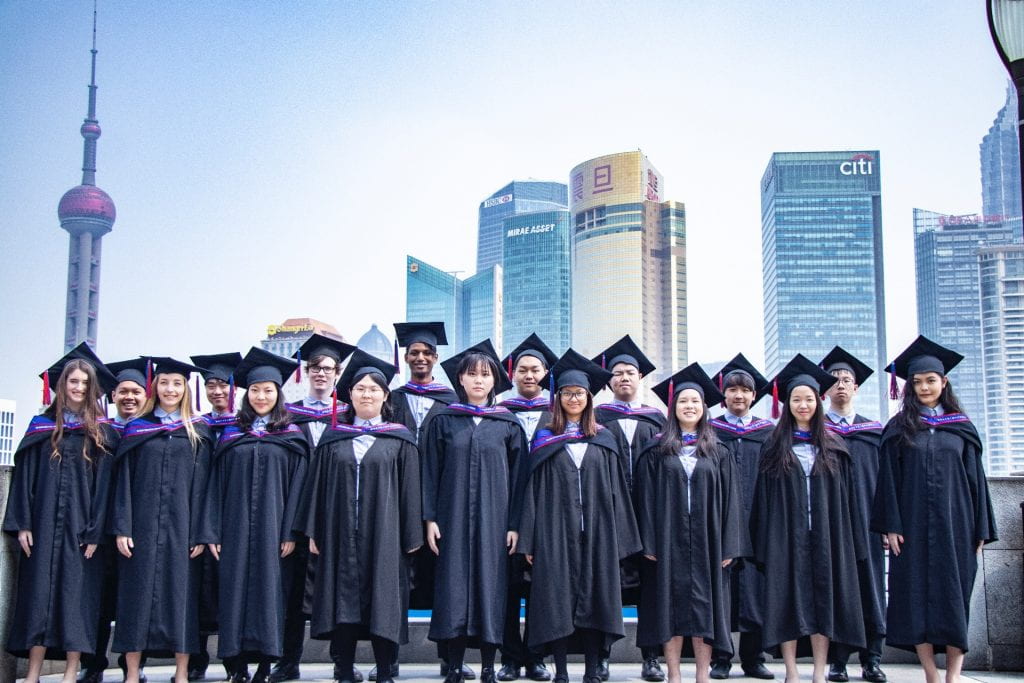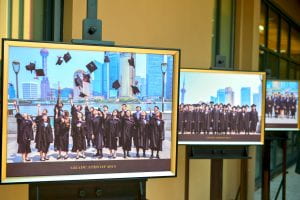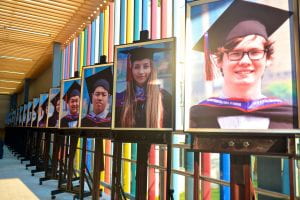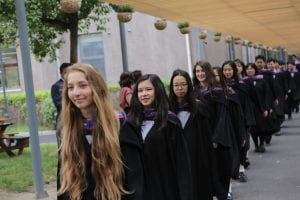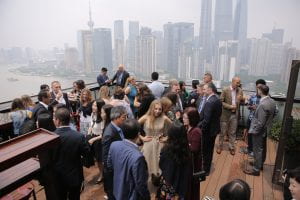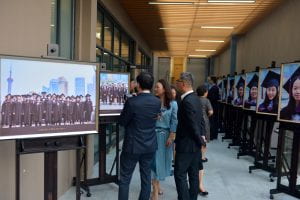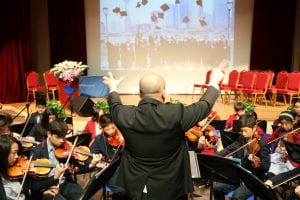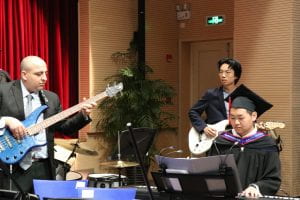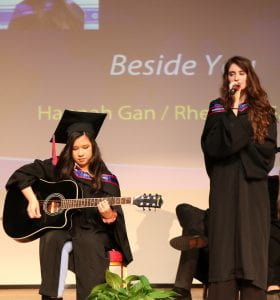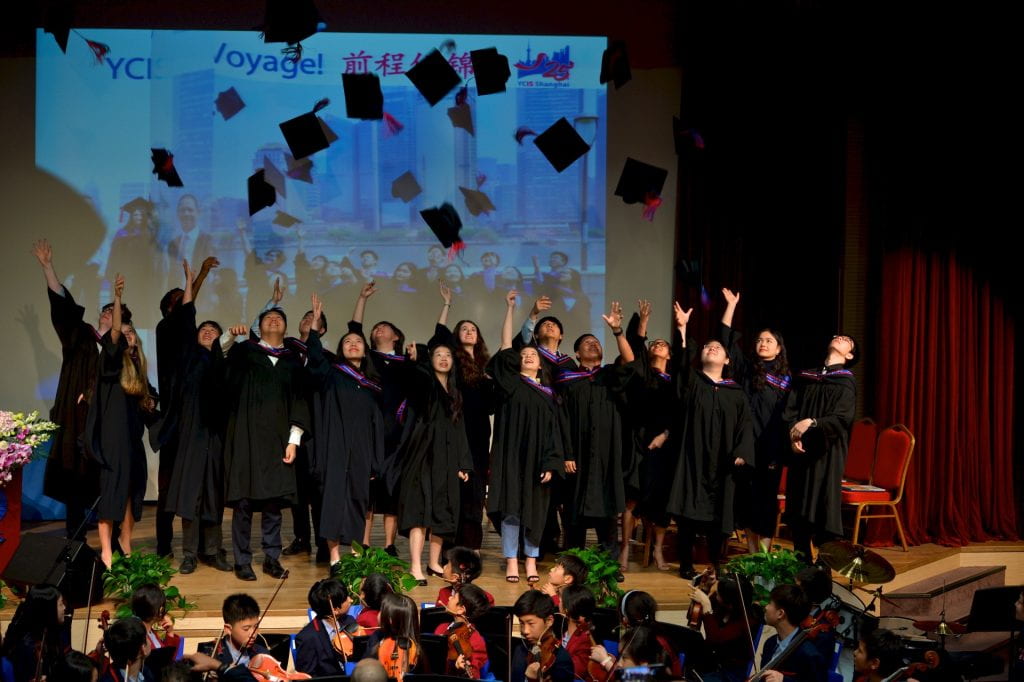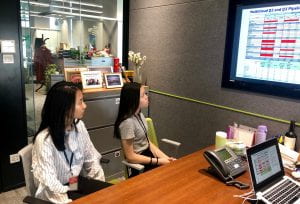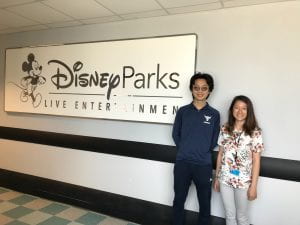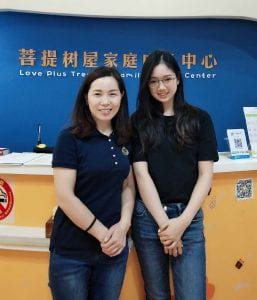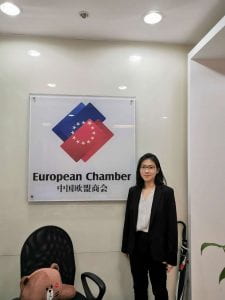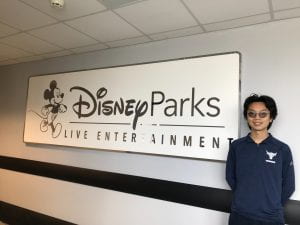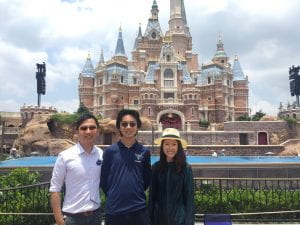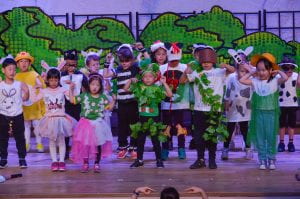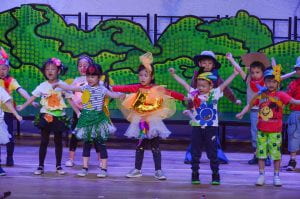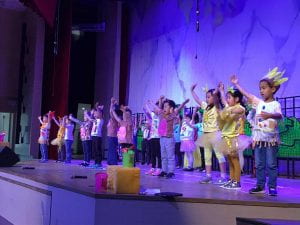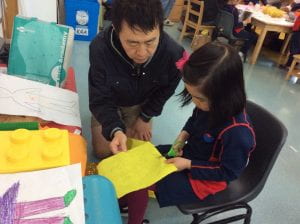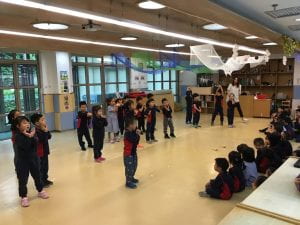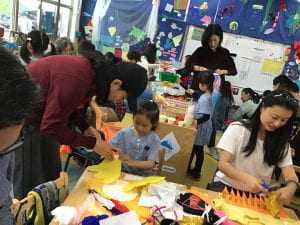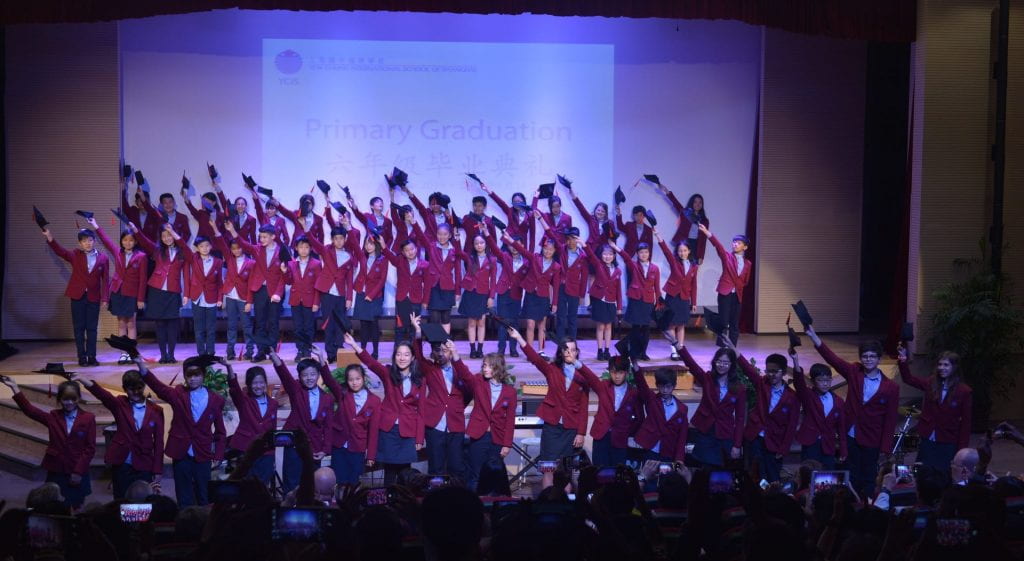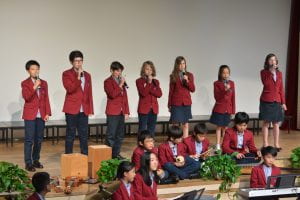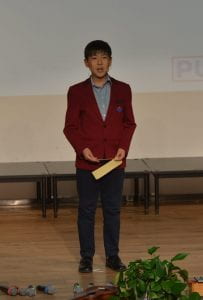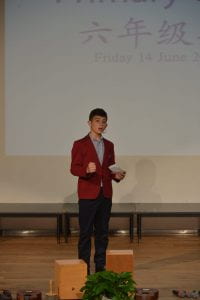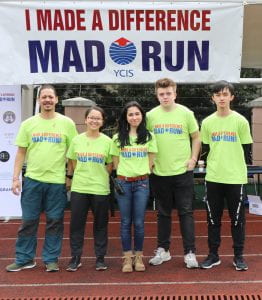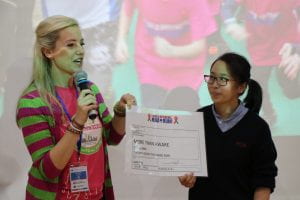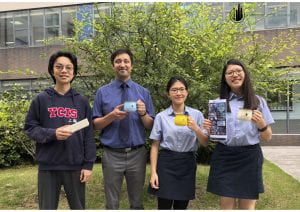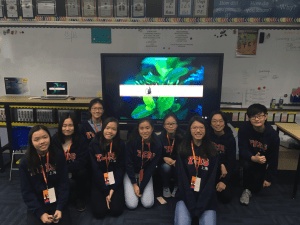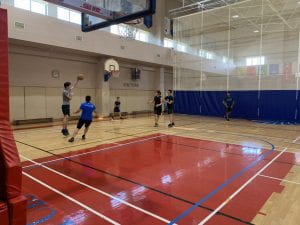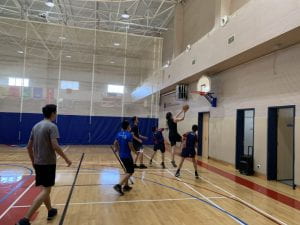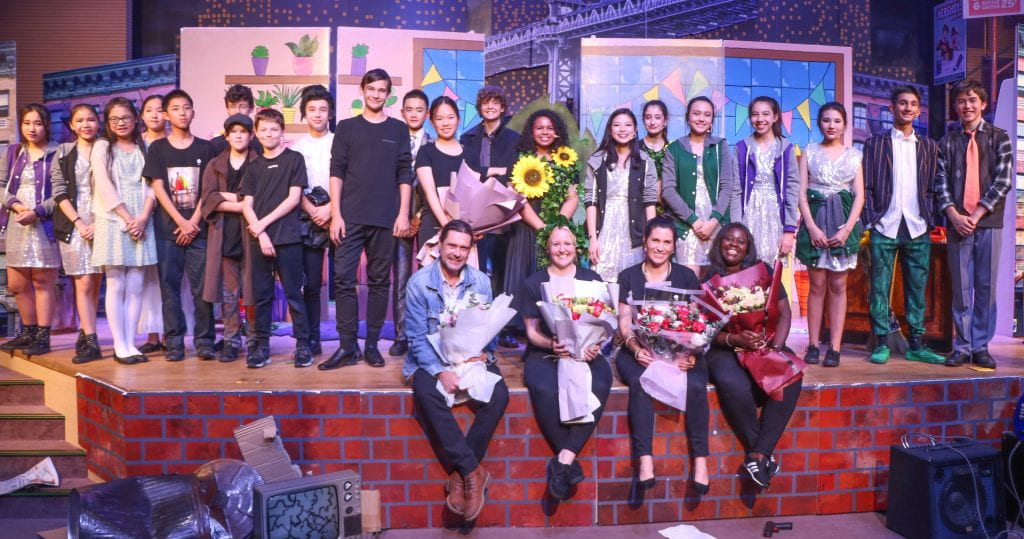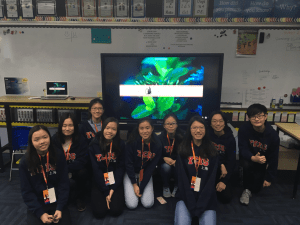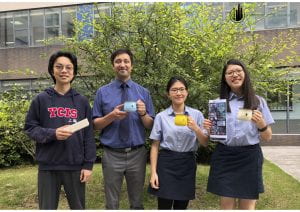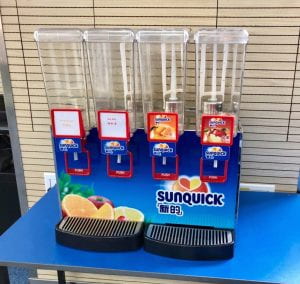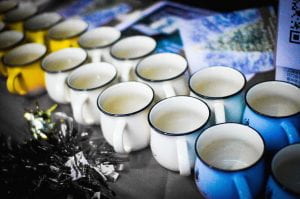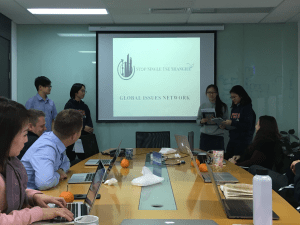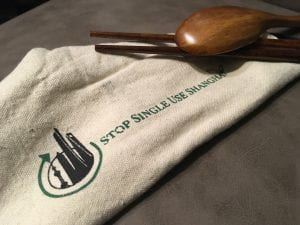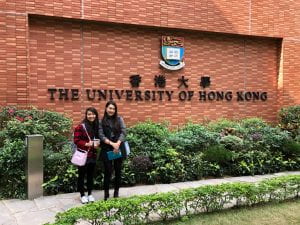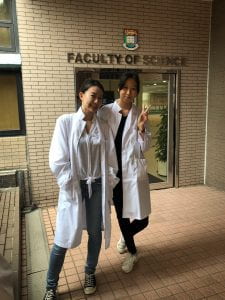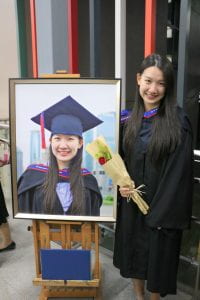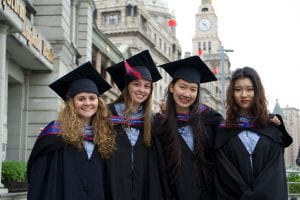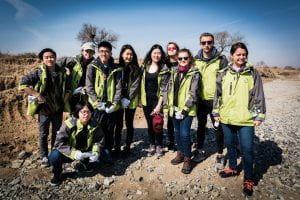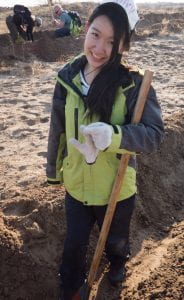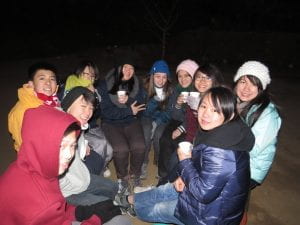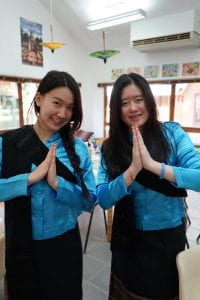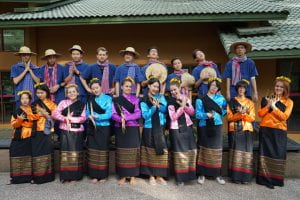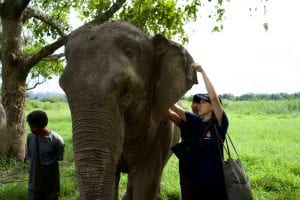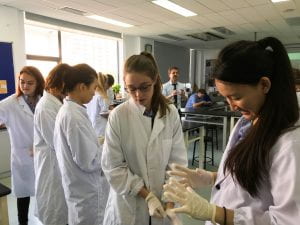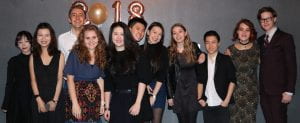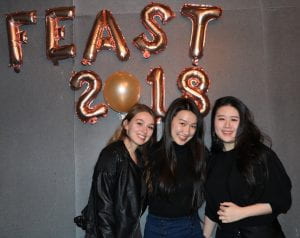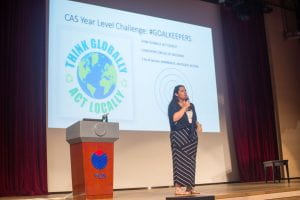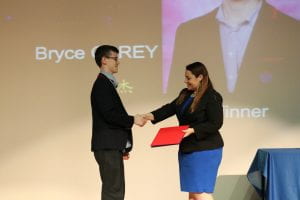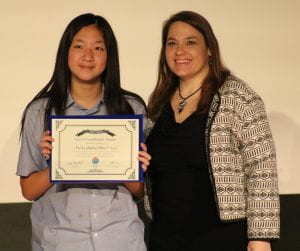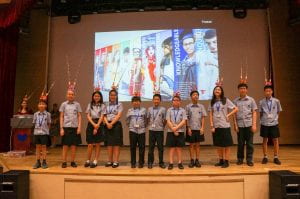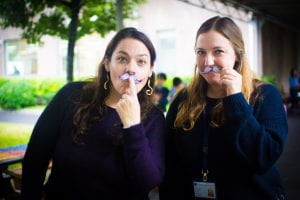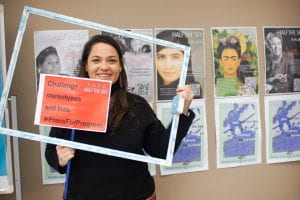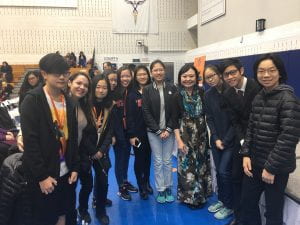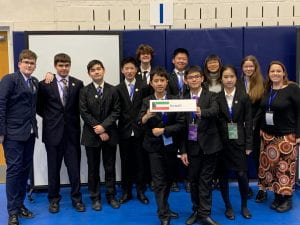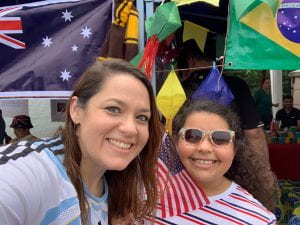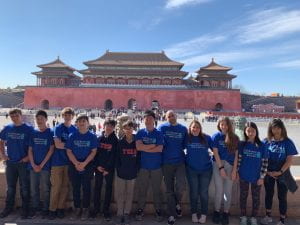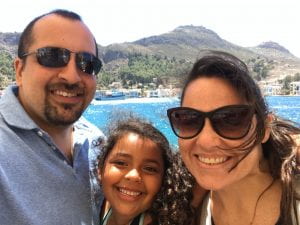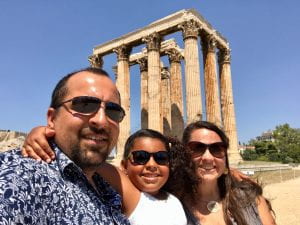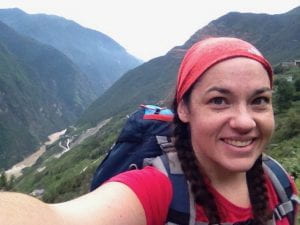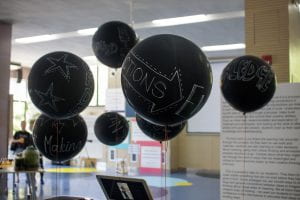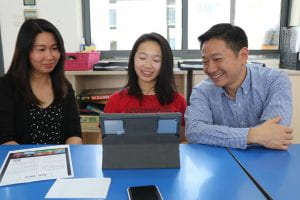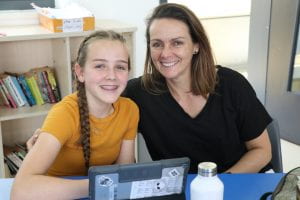Month: June 2019
Athletes Honoured at Awards Ceremony
At YCIS Pudong, all students are encouraged to participate in Co-Curricular Activities (CCAs), and, as a result, many students take up an array of sports that they may never have tried elsewhere. From floor hockey to swimming, tennis to volleyball and even Australian Rules Football, there are plenty of ways for our youngsters to learn new skills, stay fit, and to be part of a team. One of the most popular sports at the school is also the world’s biggest: football. The Football programme at YCIS Pudong has gone from strength to strength, and the school has recently proudly announced its exclusive partnership with the world-renowned Scottish football club, Glasgow Rangers. At the recent 2018-19 Sports Awards Evening ceremony, one of Rangers’ ambassadors was in attendance to celebrate the sporting success of the YCIS Pudong student body.
YCIS Pudong Athletics Director, Mr Matt Uffindall introduced Mr Mark Hateley, who played in European Championships and World Cup competitions for the English national football team, won multiple Scottish Cup and Scottish League titles with Glasgow Rangers and played for top European clubs AC Milan and AS Monaco (where he was managed by Arsenal legend Arsene Wenger). It was fitting that such an esteemed sportsman, who has played at an elite level on the world stage, should be honouring our young athletes.
Mr Hateley spoke passionately to the students, parents, and staff in attendance about his sporting career and the work he is doing with Rangers and YCIS Pudong, offering words of encouragement to our aspiring sports stars. The Rangers Soccer Schools programme has already gotten off to a fantastic start, with Rangers’ coach, UEFA-B licensed Coach Ross, working hard with our students and building a great rapport with them as well as members of the whole school community.
The focus of the evening wasn’t limited to football, however. Mr Hateley presented students with awards for their efforts in an array of sports. Awards were given to those outstanding athletes who had competed at CISSA and SISAC competitions during the 2018-19 school year in sports including swimming, basketball, cross-country running, volleyball, floor hockey, table tennis, badminton, and athletics. The students were thrilled to be in the company of someone with such a dazzling sporting CV, and the evening gave them an even bigger push to excel in their various sporting disciplines, always aiming for the elite level. Finally, YCIS Pudong parent and basketball coach, Mr Bruce Robinson spoke to the audience and was also presented with a special jersey to thank him for his tireless work volunteering for many years at the school. This was another example of how commitment and hard work extend to all areas when it comes to sport at YCIS Pudong.
Class of 2019 Bid Farewell and Anticipate Next Chapter
As the days get longer, the temperatures rise, and the summer holiday draws ever-closer, the students, teachers, and staff at YCIS Pudong have started to reflect on another successful academic year at the school, which, as always, seems to have flown by. While the school campuses have been abuzz with excitement and anticipation of summer travels and the next school year, one group of students – those in Year 13 who make up the Class of 2019 – were in a contemplative mood as their time at YCIS has come to a close.
The day before the graduation festivities began, the graduates donned their ceremonial caps and gowns and spoke at two sessions with all students from Years 4–6, answering questions about their experiences in Secondary and encouraging the Primary students always to aim high. On average, the Year 13 students have each been at YCIS Pudong for over eight years (some as long as 14 years!), so leaving the school will mark a significant change for them, and graduation is a major milestone in all of their lives. The graduates left a lasting impression on their younger peers with their accumulative knowledge about their school, their teachers, and all of the fond memories they made.
The next day on Friday, May 31, the YCIS Pudong Class of 2019 came together at the Century Park Campus for one last time to celebrate the end of an academic era. The graduating students once again donned their regalia, and the celebration began with a ceremonial procession, as the graduates walked to the campus theatre, flanked on both sides by all faculty, staff, and all students from Years 6–12, who applauded and cheered as the group walked by. This gesture showed just how deep the sense of community runs at YCIS Pudong.
The graduates then joined the Secondary School Awards Ceremony, after which they enjoyed a spectacular lunch with their families and teachers at the Bund – with the iconic view making an excellent backdrop for some beautiful photos! In the evening, the ceremony began with a lovely reception for families and staff. Afterwards, once the guests were seated in the theatre, the YCIS Pudong Sinfonia group performed a beautiful rendition of ‘Pomp and Circumstance’ as the graduates made their way to the stage. The ceremony was then opened by Mr Fred Runkel, YCIS Pudong Secondary Principal, who welcomed all of the guests and then introduced a video entitled “A Day at YCIS,” created by graduate Bobby, the soundtrack of which featured his original music composition.
Then, Mr Timothy Gartz, YCIS Pudong University and Guidance Counsellor, took the stage, welcoming and introducing the YCIS Pudong Class of 2019. Afterwards, the audience was treated to additional musical features, including a fantastic rendition of ‘Cantaloupe Island’ performed by Bobby and Year 11 student Kevin, as well as a lovely version of ‘Beside You,’ performed by graduate duo Hannah and Rheanna. Graduates Oliver and Hannah gave a speech, sharing memorable moments from their more than 10 years of studying at the school, and Mr Dudley Stuurman, YCIS Pudong Social Sciences teacher and the form tutor for the Class of 2019, was selected by the Graduates as their Keynote speaker. After Mr Stuurman’s reflective and inspiring speech, Mr Matthew Grady, YCIS Pudong IB Coordinator, shared his words of wisdom for the graduates before their diplomas were awarded by YCIS Pudong Co-Principals Mr Damien Hehir and Ms Mary Yu.
Mr Gartz reflected on the evening, saying, “It was a thrill for me to be able to introduce each graduate to our audience by sharing a few of their accomplishments and presenting them with the chance to thank their parents personally by giving them a rose during the ceremony. It’s been such a joy seeing the Class of 2019 come so far, and I wish them the very best!”
Graduation is always a bittersweet time, as it means saying goodbye to our amazing students but, at the same time, we know that they are embarking on new adventures all around the world and that YCIS Pudong has been a driving force in these journeys. We wish the YCIS Pudong Class of 2019 all of the success that they deserve and look forward to welcoming them back on campus whenever they’re back in Shanghai.
Catching the Wave to the Future
Written by: Timothy Gartz,University and Guidance Counselor
Each year our YCIS Shanghai Pudong campus offers a job shadow work experience for each of our Year 11 students. This year, the program is offered from June 13 – 20, 2019 as our students travel and meet their company mentors who will provide them orientation to their job shadow companies, learn daily site operations and be given meaningful tasks to complete.
This is more than your typical job shadowas students have the opportunity to gain first-hand knowledge of a company’s daily operations, be treated as young professionals and be mentored by highly trained professionals. They are evaluated by their mentors and also provided with valuable insights into the nature of their experiences. The past two years, we’ve grown the program to include ten YCIS Puxistudents who will join us again this year in these companies. This year the companies include: Analog Devices, ELG, IBM Finance and IBMix Graphic Design Team, Body and Soul Clinic, Disney Entertainment Studios, European Chamber of Commerce, Greenberg Traurig LLP, Oogie Art Center, Love Plus Tree Hut Family Growth Center, Parkyard Hotel and the Precision Medical Institute of the Department of Cardiology at Shanghai Jiao Tong University.
To prepare,our students created detailed high school Resumes and introduction letters to demonstrate their interests in these companies. Thecompany site supervisors have shared with each of our student’s,orientation letters that detail the learning opportunities provided and the expectations they have of the students. On the whole, the professional mentors require students who are responsible and demonstrate integrity in coming prepared to contribute with 21stcentury job skills and a positive learning approach.
Finding the right site is not always easy since our students have an eclectic array of talents and interests. Great care is taken to ensure they are well-suited to each of the chosen sites and the school utilizes partnerships made from previous years. From Fine Arts, Engineering, Scientific Research, Hotel and Hospitality Management, Law, Business Management, Film and Sound Recording etc. the list is extensive in terms of providing high quality opportunities that custom-fit each student’s unique interests. Once again, we are exceptionally grateful for the outstanding companies that have partnered with us this year.
YCIS Pudong will celebrate our Job Shadow week on June 21, 2019 with Careers Day that involves each of our Year 9 – 12 students. As Career Day approaches, students choose their most interested presentations to attend and the event finishes with a full school assembly. This is special as select Year 11 students share their Job Shadow experiences and we properly introduce our presenters and their words of wisdom to our students. As teachers, Counselors, and Students attest, Careers Day is a wonderful way to bring in some of the most talented professionals in Shanghai who provide greater clarity in making important life decisions.
Rise and Shine the K4 Musical
Written by: Veronica Martin – ECE Coordinator
Lights, camera, action!
When you think of a major musical production your mind goes towards adults entertaining everyone after years of practice. The musical Rise and Shine was put on by the K4 students with support from their Co-Teachers and the Music Teacher. Students selected some of the songs they would sing and helped create dances they would dance.
The musical Rise and Shine was about Spring and how animals and flowers grow and you can see new life everywhere. Each child had a dancing and singing part, some children narrated the story either in Chinese or English. The children designed their own costumes from nothing and their parents came in to help create their vision of their character in the show.
The show was wonderful andeveryone was very proud of the students, however, it was the learning along the way where the real progress was made. Students who were not able to speak in another language, learned how to sing and express themselves in both Chinese and English. In the weeks leading up to the show the hallways were full of song as children were walking around singing parts of the songs.
Students who were not confident in their creative expression designed and made their own costumes; students who did not understand how a musical was created learned about stage presence, character development, lighting and along the way they all learnt more about the beauty of music.
This is what some of the K4 students had to say about the experience:
Yvonne- K4A – “It was called Rise and Shine, it was fun. I want to play in a concert again”
Zifeng- K4B- “My mum helped me to make the costume, l was a sun. I had fun”
Rosie- K4B- “I liked my lines, l was a baby chick and l danced and sang to everyone”
Dylan- K4C- “I was a duck and l said, “quack, quack”. I loved it, l want to sing more”
Music is an important part of YCIS and especially for our youngest learners who connect to the tunes easily. Our Performing Arts Director, Mr. Nick Adgemis oversees the program with Ms. Diana working directly with the children as the Music Teacher. The ECE Children look forward to their classes with Ms. Diana as together they build a strong foundation of musical appreciation and exploration. The musical has given the K4 children the confidence to move forward in their musical education and the ability to participate in many more musicals in the future.
Primary Graduation
Written by: Cathal Grimes, Y6 Year Leader
The students of Year 6 are getting ready for the transition into Secondary. We asked the students for 5 things they loved about Primary and 5 things they are looking forward to in Secondary.
5 things we loved about Primary School
- Camp – In Year 5 we had a great time at camp, and Year 6 was even better! There was hiking, rock climbing, and kayaking. It was so much fun. – Jamie 6A
- Spring Musical – “So Much Good” was one of the songs we had to sing and it really was so much good. It was great performing in front of our families and the other students. – Darling 6B
- CISSA Sports – I loved playing on CISSA teams this year. Having the chance to compete against other teams was very exciting. – Yuseong 6C
- Our Teachers – All the teachers in Primary have been so kind. We are so lucky to have co-teachers that know us so well and can help us learn. – Carrie 6A
- Friends – The best thing about school! We’ve made our best friends at YCIS. What would we be without them? I will miss them over the summer. – Sasha 6B
5 things we are looking forward to in Secondary
- EOTC – I am looking forward to the trip to Xi’an in Year 7. I have heard so many great things from the older kids. – Amaliya 6C
- Spanish – Learning a new language will be difficult, but I am really excited to try. We had a taster on Transition Day and I loved it. – Alana 6B
- Technology – We already had some sessions in the D&T lab, but next year we get to go there all year! – Antonio 6A
- More teachers – Next year, every lesson will be with a different teacher. We will get to know so many of them and they will get to know us. – Vandy 6B
- iPads – We will get to have our own iPads! It is a big responsibility, but we are ready for it! – Lucas 6C
Student Leadership at YCIS Pudong
Written by: Andy Clapperton, Head of Learning
At YCIS Pudong, it is not just our formal student leadership programmes that empower young adults to develop softskills. Leadership opportunities permeate through all we do, and at the end of the year, we thought it would be a good opportunity to recognise, celebrate and hear from a few students who have taken on their own roles as leaders in our community.
Oi In Lin – MAD Run
One of the biggest challenges was to keep track of all the logistical aspects in organising such a large event. To overcome this issue, I made an extensive Excel spreadsheet to track job delegations, volunteer sign-ups, food vendors, sponsors, etc. This was a new experience for me due to the sheer scale of the event we had to plan, with so many things going on at once, but I learned that by creating a clear structure, my role was made considerably easier. I really enjoy managing large projects like these, and I would gladly take on this challenge again.
Ann Huang – Stop Single Use Shanghai
I have learned to delegate and realised the importance of assigning different roles and responsibilities to group members. From negotiations with campus leaders and the cafeteria manager, I have become more familiar with the processes that need to be undertaken when making a decision or passing a proposal in an organisation.
Climate crisis is becoming more severe. Therefore, ever more change needs to be implemented quickly and effectively, and this is our responsibility as citizens. Keeping this idea in my mind has helped me to stay motivated, and I believe that sharing my enthusiasm for this global issue has helped push the project forward. After all, it is vital that we consider the implications of all our actions, including the consumer choices that we make in our daily lives.
Elliot Koh and Alex Cho – Fitness CCA
Establishing a balance between fun and challenge was definitely one of the most difficult aspects we had to get right, because we needed to develop routines that would push people physically but also build a sense of camaraderie within the group. We learned how to be decisive and assign roles, and also to be inspirational, so that when it starts to get tough, making sure everyone gets through the workout is always the number one priority.
 Natasha Shen – Technical Director of Little Shop of Horrors
Natasha Shen – Technical Director of Little Shop of Horrors
One thing I came to understand through this experience was that when things don’t go as you planned, you need to adapt really quickly and find a workaround. The tiniest hitch can have a huge knock-on effect, and I really experienced the butterfly effect with this show. For instance, I had the team using walkie-talkies for communication between the stage crew and the technical director positioned at the back of the audience, and during the show the walkie-talkie stopped working, resulting in a moment of chaos. We had to respond immediately and ended up physically sending people up and down to relay information in order to get the props in the right places at the right times. This experience really taught me to be flexible, especially with such a large cast, meaning that it was more challenging to get everyone to do exactly what was needed.
Secondary Students Propose ‘Green School Initiative’
Written by: Danial Siddiqi, Economics and Business Studies Teacher
The ‘Stop Single Use Shanghai’ committee (SSUS) was established in 2018 with the aim being to reduce the consumption of single use plastics at the Century Park Campus. The students leading this initiative (Ann Huang, Oufan Li, Kevin Du, Bobby Cheung, Hayley Chu and Mary Liu) have already achieved a number of successes including the introduction of a cold drinks dispenser in the school, thereby reducing the number of plastic bottles purchased. They have also led a strong advocacy and behavioral change campaign to encourage students and staff to think more carefully about their decisions regarding single use items.
In recent weeks, the students were able to take their campaign further and establish it as a movement across the whole organisation. Working together as a team, the students drafted a two-page action plan calling for the establishment of a ‘Green School’ policy. This letter was sent to Dr. Betty Chan and the Executive Board. Dr. Chan was so impressed with the suggestions that she arranged for the plan to be sent to all the Yew Chung and Yew Wah schools within the organization, so that their School Leadership Teams (SLTs) could also look to explore ways to reduce consumption of single use products. This is a fantastic achievement and all down to the tenacity and passion of our students!
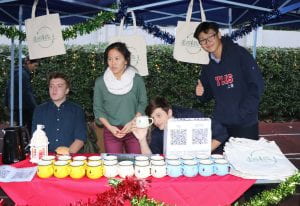 One member of the Executive Board, Jimmy Ji and some of his team came to Century Park Campus to meet with the SSUS team. Together with members of the Eco Committee, the students delivered a presentation summarizing their achievements and outlining future plans. Mr. Ji wasso impressed with the students thathe promised to support the campaign further next year to ensure it achieves its vision of minimizing single use plastic use in schools.
One member of the Executive Board, Jimmy Ji and some of his team came to Century Park Campus to meet with the SSUS team. Together with members of the Eco Committee, the students delivered a presentation summarizing their achievements and outlining future plans. Mr. Ji wasso impressed with the students thathe promised to support the campaign further next year to ensure it achieves its vision of minimizing single use plastic use in schools.
It has been a pleasure to work with such a passionate group of students who are determined to make changes to ensure our school and the whole organization operate in a more sustainable way. The changes they have implemented have already made a big difference at CP campus and I look forward to working with them as they seek to make further reductions in our single use consumption across YCIS Pudong and at home in the next academic year.
YCIS Pudong Alumni: Cindy Liu, Class of 2018
When her family moved to Shanghai in 2011, Cindy Liu enrolled at YCIS Pudong and spent seven years at the school before graduating. Upon graduation in 2018, she moved to Hong Kong where she is about to complete her first year studying Biological Sciences at the University of Hong Kong, with a plan to major in Molecular Biology and Biotechnology. Cindy will be in Shanghai this summer to visit her family, and we look forward to welcoming her back on campus very soon!
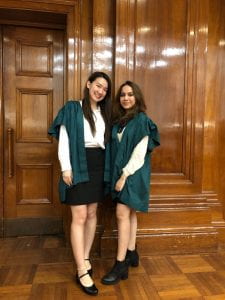 Can you tell us what you are studying now (your major and other classes)?
Can you tell us what you are studying now (your major and other classes)?
I am currently taking one course about Evolution and Biodiversity, one General Chemistry course, and a Science Foundation course. These classes are compulsory for my major. In addition to that, HKU also has compulsory courses called ‘common cores’ where we learn about things that are not necessarily related to our major. I am taking two common core courses right now; one is related to psychology, and the other one focuses on genocide.
What do your day-to-day studies entail?
Since I am still in the first year of my studies, most of my science classes are lecture and exam-based. In addition, we also have labs. In the Evolution and Biodiversity course, the lab typically consists of looking at different living specimens and answering questions related to them. In the Chemistry class, we have labs regarding basic concepts of chemistry such as chromatography, titrations, and infrared spectroscopy. In the common core courses, there is a stronger emphasis on assignments. For example, in the course related to psychology, we wrote two papers and completed a group project, and for the class on genocide, we are currently working on a group project where we investigate a particular incident of genocide in detail.
What are you learning that you enjoy the most?
I am really enjoying learning more about humans, so I find physiology and genetics fascinating. I also enjoy my psychology common core a lot because it is about the human brain and how it makes us who we are. This is the first time I’ve studied psychology.
Why did you decide to study at Hong Kong University and your particular major?
HKU has a lot of international students, which is something I was looking for. Additionally, HKU offered me a significant scholarship. Other than that, I knew I wanted to do something related to biology because that was the class that I enjoyed the most during high school. I ended up studying Molecular Biology and Biotechnology because it is a field with lots of potential in the future.
How was the transition from YCIS to university?
The transition to university was not as difficult as I had expected. The most significant change was the number of people in school, as YCIS was a very tight-knit community. The teachers knew us well in person, and almost everyone in the school knew each other. In university, there are many people. Even though you recognise your lecturers on the streets, they might not recognise you, and you meet so many people, it becomes a challenge to keep track of their names and faces. I wouldn’t say this is difficult, but it was different from what I am used to.
How did your experience at YCIS help prepare you for university both academically and beyond the academics?
I think one of the most essential things YCIS taught me was time management. Especially in Year 13, we had deadlines on top of deadlines, which helped me learn how to prioritise and work efficiently. We were also participating in many extra-curricular activities at the same time, which taught us how to balance schoolwork and other interests. I have found that when many students start university, they actually have a lot of trouble managing their time and balancing between their assignments and activities. As such, in university, I am a lot less stressed than other students.
Were there any challenges you had to adapt to when starting university?
Moving to a new city was a bit of a challenge for me because people in Hong Kong don’t speak English or Mandarin that much – they tend to prefer speaking Cantonese. I’ve never lived in a city where I did not understand the local language. So, last semester, I took a Cantonese course. As Cantonese is the primary medium of communication here, the class helped me a lot in daily conversations.
How did your past experiences at YCIS help you cope with these challenges?
When I first joined YCIS in 2011, I didn’t speak any English because I grew up speaking Japanese and a bit of Mandarin. I remember, back then, I tried communicating in any way possible, including body language, Mandarin, or dictionaries. I would also ask my friends what a word meant or how to use it and try to use the words I learned as much as possible.
I realised that the teachers are very willing to help and will understand your situation.
Do your current studies connect to what you learned at YCIS?
Since I am still taking first-year courses, a lot of the content covered in the classes are things I actually already learned in high school. In addition to that, I am also using a lot of the skills and techniques I learned during Chemistry class at YCIS in my chemistry lab.
What are the biggest differences you have found between living and studying in Shanghai and in Hong Kong?
I think the biggest difference is that not everybody in the school has had the same educational background. At YCIS, although we were all from different countries, we all shared a similar experience in terms of living in a host country and studying at an international school. In HKU, not everybody has had the same experience. A lot of the students went through the local system of their own country. I was surprised to learn that they had never written an essay or worked on a group presentation.
What are the similarities/differences between YCIS and Hong Kong University?
I think the biggest similarity is the emphasis on the balance between Western and Eastern culture. YCIS has a strong focus on studying the Chinese language as well as its culture. Of course, we also discussed Western culture in our classes. Consequently, my knowledge about both Western culture and Chinese culture improved at YCIS, as did my English and Mandarin. At HKU, there is also a strong emphasis on this balance. Although the classes are all taught in English, we are required to complete Chinese or Cantonese language classes and a common core class related to China. At HKU, we also celebrate a lot of the Chinese holidays such as Chinese New Year, as well as Western holidays such as Easter.
I think the biggest difference between HKU and YCIS is the size. YCIS was a very tight-knit community where everyone knew who you were and what you were up to. At HKU, that’s not the case, and you have to keep track of your own work and life. Of course, some people are willing to help you, but they won’t chase you and make sure that you’re on top of things.
Where are your classmates from?
At HKU, there are students from all over the world. As the name might suggest, the largest number of students are from Hong Kong. There are also lots of Mainland Chinese students because you can apply to HKU with Gaokao scores. Plus, there are a lot of exchange students from the UK, Europe, and North America. Many full-time international students are from Korea, Southeast Asia, and Malaysia. I have also met students from South Africa, Macedonia, and Kazakhstan. Other than that, there are also many students like me, who have a “global” background, and it’s interesting to hear about their origins. I was very excited to find other students who are also Chinese but who were born and raised in Japan and did IB, like me.
What do you plan on doing after you graduate?
My current plan after I graduate is to go into the research field, so I will probably pursue further studies. However, I am not sure if I would like to be a researcher, so I am trying to gain as much research experience as possible in my early years to see if that is what I want to do. If I don’t enjoy research, I might look for internships related to biology and perhaps work in a biotech company.
Are you doing any summer internships, or have you had any other experiences you’d like to share?
In the HKU science department, we have a program called the Summer Research Fellowship where you can work in a lab over the summer with stipends of $14,000. Usually, not many Year 1 students participate in this, as we are only allowed to participate in this once during our university degree. However, fortunately, I have been selected for a similar programme called the ‘Young Science Scheme’, which is something you can participate in multiple times. I will be working at the medical campus doing research regarding the lytic replication of Epstein-Barr Virus. This virus can infect humans and cause a range of disease, including infectious mononucleosis, lymphoma, and nasopharynx cancer.
What do you miss most about Shanghai?
I miss how convenient Shanghai is. You never have to bring cash, and you can have everything delivered to your doorstep. Hong Kong is still a very much cash-based society, so you have to bring your wallet everywhere. Also, parcel delivery and food delivery services are not as cheap or fast. I miss how spacious Shanghai is. Although Shanghai and Hong Kong are both cities, Shanghai has more space and is less crowded. Most of all, I miss my family and my friends. I’ve made so many good memories in Shanghai, and I definitely cherish all the happy moments I had there.
What do you miss most about YCIS? Any favourite memories from your time at YCIS?
I look back fondly on the school trips at YCIS because they were always unique. It is a rare opportunity to be able to go on a trip with your friends and stay at a villager’s house in Guizhou, or to plant trees in the desert or to ride elephants in Thailand together. But most of all, I miss our moments in the IB lounge. The lounge made YCIS feel like another home where you could help each other with your assignments, relax over coffee, or laugh with your friends about random things. I always loved having interesting conversations with all my classmates during lunch time.
Do you keep in touch / see any of your YCIS classmates?
My classmates and I keep in touch in many ways, including texting, video calls, and sending each other funny posts on Instagram. Luckily for me, Hong Kong is also a place where a lot of my classmates can drop by. Every time someone is in Hong Kong, they let me know, and we meet and catch up.
Can you share any advice/suggestions for this year’s Graduands and our other Secondary students to help them prepare for the transition to university?
I think the most important thing is not to overwhelm yourself. I worried about going to university a lot in the last year of high school, thinking about leaving home, making new friends, and the change in my learning environment. When I got to HKU, I transitioned pretty well and realised that there was nothing to worry about. Instead of worrying, I think it’s important to be excited about the future and also to enjoy the remaining time with your high school classmates.
Staff Focus: Janelle Garrett, Lower Secondary Coordinator
Written by John McEnhill, Primary Coordinator
What is your role in the School?
I’m currently the Lower Secondary Coordinator. I’m tasked with helping ensure that students in the crucial middle years, from Year 7-9, get the learning opportunities, along with the pastoral and academic support they need, to become caring and effective learners. I also still get to be in the classroom a bit, and teach Spanish and Humanities.
You have an interesting and international background – tell us a bit about that?
Originally from the United States, I grew up in Buenos Aires, Argentina attending local schools until high school, ultimately graduating from Lincoln (the American International School there) before leaving to attend university at Dartmouth College in the United States. Like most of our students, I’m a proud TCK (third-culture-kid) now grown up and raising another TCK in our international family. My husband, Performing Arts Director, Mr. Nick Adgemis, is Australian, of Greek heritage, and our daughter is Brazilian. I’ve always felt most comfortable in an international multi-cultural environment and have enjoyed traveling to, studying, and living in various countries.
Tell us about your different language skills?
Although my poor Mandarin is an embarrassment on this front, I love learning languages and am fluent in English, Spanish, Portuguese and French and studied Japanese and German. I grew up speaking English and Spanish interchangeably and consider both my “first languages”. I really appreciate the commitment YCIS has to helping our students gain not just linguistic fluency, but intercultural competency in both Chinese and English from K2 all the way through to Year 13. With YCIS’s recent commitment to also promoting other world languages, I was very excited to be part of bringing Spanish to the YCIS curriculum in Lower Secondary.
You have been heavily involved with Model United Nations (MUN). Explain what this is and why you think this is so important?
I traveled to Caracas, Venezuela for my first MUN conference when I was a Year 11 student in 1992. As a 15-year-old, MUN was an educational experience like no other. I read more, thought deeper, wrote smarter and spoke better than I had ever had before. The skills I developed in research, critical thinking and argumentation, writing, public speaking, debating, collaboration and consensus-building and more, far exceeded what I was able to learn in any classroom and made my learning when I went back to school so much more relevant. I continued to participate actively in MUN through high school and at university. As an educator, I’m committed to promoting MUN because its an authentic audience and the focus on tackling complex real-world problems provides our students with meaningful opportunities to really engage as learners. This is what being “committed to global education” is all about.
MUN also gives our students a chance to be part of an amazing community as they attend conferences with top students from schools all over the world and try to come up with solutions to pressing global issues. It is incredible to be part of this network of committed global citizens.
You have previously worked at other international schools in Shanghai. What do you think makes YCIS special/unique?
I like that YCIS is truly international and its school culture and curriculum are grounded in the global community it serves and its own context in Shanghai, China—it is not trying to be British or American outside of those contexts which I always felt was a bit contrived. It’s commitment to excellence in both English and Chinese all the way through to Secondary is important to me and it’s results are incredible. I also love its deep commitment to holistic education—I realize most international schools do this, but at YCIS this commitment extends beyond CCAs and other learning opportunities and is embedded in its character education, culture, and care for each student.
You work in the same school as your husband, and your daughter is in the Primary. How do you find that works for your family?
An international school like YCIS is more than just a school or a workplace, it is our community and a family away from home. With so many different events in school life, especially with my husband involved in Performing Arts, it would be difficult to participate wholly in school life as a family if we weren’t in the same school. As an educator, it is great to have your own child in the school you teach at because it means you become acutely aware of any issues or shortcomings that should be addressed and you are that much more invested in ensuring this is the best possible learning environment for your own child and all children. That being said, with work and school life fully intertwined and shared in our family, it is easy to let this become all-consuming, so we have to place boundaries at home that help us leave work/school behind and enjoy necessary restorative mental “time off.”
You have been heavily involved in promoting the UN Sustainable Development Goals in Secondary this year; why do you think they are so important?
The UN Sustainable Development Goals (SDGs) are the world’s global goals for a better future within the next decade. They are ambitious and they should matter to each of us if we want to have a future that is equitable, that promotes education, human rights, and the dignity of all individuals, respects diversity, and that is sustainable. Education is a transformative force. As a global citizen and as an educator, harnessing this force and using the power of education to help our students asunderstand the issues and work together to come up with solutions is key.
SDGs really should be a driving force at the heart of what we do as educators. Why learn Mathematics or Science if we can’t use it to find innovative ways to build sustainable cities or ensure we all have water and other natural resources, or to find more efficient, cleaner energy sources? Why study History, Economics, Geography, or Literature if it can’t help us achieve peace, combat poverty, address injustices or develop stronger, more just institutions?
We recently had a fantastic and revamped Secondary SLC. Why are SLCs important and what changes you have made?
Reflection is a critical part of the learning process. For Lower Secondary students, our Student Led Conferences are an important part of their learning journey as they reflect about their learning this year and conduct 25-minute conferences with their parents. Through reflecting on their learning, students give their learning new meaning. External sharing of reflections multiplies the learning for each individual and helps both parents and students learn a little more about themselves as learners, strengthening the school-home partnership.
Our goal with SLCs this year was to really engage students and parents in a broader conversation about learning that went beyond their performance in the classroom and looked at how we learn and what tools their children are using to deepen their learning in the classroom and beyond. To this end, students and parents had the chance to participate in various workshops together on topics ranging from ‘iPads and Learning’ to ‘Study Strategies to Exam Success.’ The Cafeteria at Century Park Campus was also transformed into an interactive gallery, becoming the Creative Hub. To help parents and students focus on the next steps in their journey, we also hosted a university guidance panel with expert panelists from top universities like Duke, NYU, Wash U, Dartmouth, Stanford, and Harvard sharing advice on how to help our students maximize their resumé in the middle years for success in university placement.

